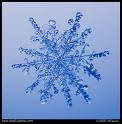And if ever there was it led forward life, and does not wait at the end to arrest it,
And ceas'd the moment life appear'd.
All goes onward and outward, nothing collapses,
And to die is different from what any one supposed, and luckier."
Walt Whitman wrote that in "Song of Myself", and five years ago I read it to the congregation at my brother's funeral. My brother was only 47 years old. He died suddenly while on a trip to California with friends, from a rare virus that attacks the heart and enlarges it. He left behind a loving wife and two adolescent children. By any normal measure, this was a tragedy. But his funeral was a celebration, and one of the most amazing experiences of my life.
My brother and I were exactly the same except in the ways we were complete opposites. Well over 6 feet, broad-chested and deep-voiced where I am a slender tenor, he was known as "Big Mike" by just about everyone, and just about everyone knew him. While I have always been drawn to alternative religions, he was very traditional. He spent 2 years in a Catholic seminary before going evangelical, and spent most of the last third of his life traveling throughout Illinois, Indiana, and Wisconsin, founding bible studies, youth ministries, and church music groups everywhere. Especially the music, which was a first love of both of us, and our strongest bond. Politically, we saw eye to eye in a strange way. I'm a good ol' fashioned liberal, while he was a William Jennings Bryant-style Populist: social conservative, economic liberal. We had the usual we-are-family-so-we-won't-talk-religion unspoken agreement, which is my only regret: I would have loved to really talk with him about it.
Needless to say, his death was a shock, but if anything, his funeral was even more so. The whole family knew he had "devoted his life to God", but had no idea what it really meant. The service was held in a big old Lutheran church he was a nominal member of, and it was good that it was held there, because it was literally standing room only: we later estimated there were about a thousand people there. Members of every church he visited, every group he founded, every life he touched showed up. After the initial service, the mike was opened up to everyone, and people talked for nearly 3 hours about my brother, how amazing he was, how he had touched and improved their lives.
I thought long and hard about what I was going to say beforehand, and finally chose the 6th stanza of Walt Whitman's poem "Song of Myself", part of which I quoted above. It was strange to walk up in front of all those strangers who knew my brother, strange to stand in front of a church congregation for the first time since I dropped out of my church choir at 18. But in sharing those words, I felt myself heal. In reaching out to all those people with these sentiments, that death is not an end, but a change, the wound in my heart in the shape of my great mountain of a brother started closing, just as I helped all of those strangers to close theirs.
So what does this all mean, and why do I share it here with you? Because despite all of our faiths and beliefs, we don't actually know what happens when we die. We think we know, but it is all conjecture and intuition. But if there is one lesson I brought from the untimely death of my brother, it was this: that even if we do wink out like a candle when we die, what greater and truer immortality is there than to leave behind a great mass of people who remember you fondly? The kindly actions of my brother will echo down through the years, carried on by all the people whom he helped, inspired, and brought peace to. In this, he lived a thousand years. In this, he found heaven.
CS

Very impressed with Curious Snowflake, I have puzzled over what to tell my children about life and religion, and when to tell them. I think you hit a sweet spot of simplicity, it reminds me of a simpler version of "conversations with god", a book that gave me a headache.
ReplyDeleteThe parallels with the CWG books are no coincidence, I'm a big fan and they very much inspired my little ditty. Those books are some heavy shit, especially once you get to the second and third one. I think the key to getting the CWG books is to remember (and this is something Walsch himself wrote in the books) that even if they really are God talking, they are still coming through the filter of Neale Donald Walsch, and thus are colored by his beliefs, ideas, and opinions. A good point to remember about ANY religious book :-)
ReplyDeleteThere are more than a few things in those books I think are bullshit (like our bodies supposedly designed to live forever), but there's also a lot of good stuff there. I didn't get a lot of it the first time I read them about 6-7 years ago, but I recently took to listening to them in the car on the way to work and a lot more of them make sense now. They are books meant to be chewed on for a while, not just swallowed and immediately digested.
CS